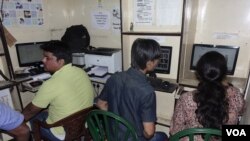Indian authorities say they are reconsidering a massive crackdown on online pornography after blocking more than 800 websites deemed to have offensive and illegal content in recent days.
Authorities had ordered internet service providers to take down sites that officials said had become a “social nuisance.” Some accused the sites of promoting child pornography.
"A new notification will be issued shortly. The ban will be partially withdrawn. Sites that do not promote child porn will be unbanned," Information and Technology Minister Ravi Shankar Prasad told reporters Wednesday.
Indian media report the government will still ban those websites which carry "hardcore" pornographic materials, making it unclear how many sites will come back online.
Defying India’s Supreme Court
While the government says the clampdown is aimed at protecting morality and decency in the society, the move has triggered a debate about censorship and curtailment of personal liberty.
The government action also appeared to defy a recent Supreme Court statement that refused to pass a widespread ban on pornography.
The statement came during an ongoing 2013 petition from a lawyer who argued that pornographic sites should be banned as “most offenses committed against women/girls/children are fuelled by pornography.”
The lawyer, Kamlesh Vaswani, said he was motivated to bring the case by the brutal gang rape and murder of a woman in New Delhi that sparked mass protests and a national conversation about women’s rights in India.
However, last month the Supreme Court declined to pass an interim order to block websites that carried pornographic contents citing that it would amount to transgression to/of citizen’s personal liberty.
“Such interim orders cannot be passed by this court. Somebody can come to the court and say ‘Look, I am an adult and how can you stop me from watching it within the four walls of my room? It is a violation of Article 21 [right to life and personal liberty] of the Constitution.’ Yes, the issue is serious and some steps need to be taken,” the Chief Justice of the Supreme Court said.
Right to Internet and cyber law expert Prashant Mali noted that the Supreme Court had not signaled any crackdown on online pornography, and the government action was a proactive step.
“The government’s proactive move of banning the sites goes against Article 19(1)(a) of the constitution i.e. Freedom of speech and expression. It should have waited for the Supreme Court’s decision in the case which is still going on.”
Regulating Pornography in Culturally Conservative India
India’s television and film industry heavily regulates the depiction of sex and for decades on-screen kissing was a rarity.
The nature of the internet makes it impossible to police content in the same way, but Pranesh Prakash, policy director of the Bangalore-based Center for Internet and Society research group said there was no evidence that any of the sites violate Indian laws.
“These sites were blocked without any prior adjudication that these are unlawful in India. The ban seems illegitimate. It is undemocratic because there doesn't seem to be any finding of unlawfulness on these websites,” Prakash said.
Following Chinese, Indians are the second largest users of the Internet.
Although Indian society is largely culturally conservative, scores of people visit pornographic websites on the largely unregulated internet.
According to Pornhub, a popular online pornography portal, Indians were the fourth largest national users of the site during last year.
Debate Follows Ban
Indian filmmaker Varma was among those who took to social media to denounce the ban. He tweeted that given the popularity of the pornographic material any government which owned up to banning porn would lose the next election.
“To ban porn saying it will be seen by who shouldn’t see it is like saying to stop traffic because there will be accidents,” Varma said in another tweet.
Former junior minister of information technology and communications of India tweeted: "The latest ban is not about liking or disliking porn. It's about government hijacking personal liberties. What'll they ban next - phones and TVs?"
However, the ban was also been welcomed by many others in India.
“Even small school-going children are watching porns secretly in India today. Senior students are also accessing the harmful sites in cyber cafes, among other places and turning sick. This government led by Modiji (Modi) has taken a bold step by banning the sites,” Ajay Nandi, an executive of Vishva Hindu Parishad, India’s largest Hindu organization, said to VOA. “There will be resistances from many quarters. The government should not bow down before those pressures because this ban is in the interest of the country.”




